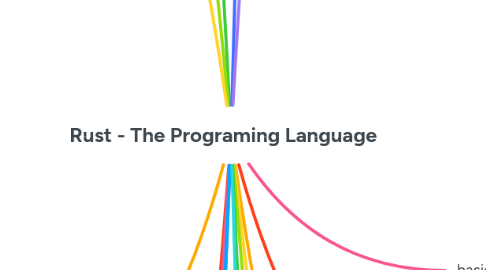
1. basic data types
1.1. scalar
1.1.1. integer
1.1.1.1. i8
1.1.1.2. u8
1.1.1.3. i16
1.1.1.4. u16
1.1.1.5. i32
1.1.1.6. u32
1.1.1.7. i64
1.1.1.8. u64
1.1.1.8.1. 1_000_000 = 1000000
1.1.1.9. i128
1.1.1.10. u128
1.1.1.11. architecture specific
1.1.1.11.1. isize
1.1.1.11.2. usize
1.1.2. floating point
1.1.2.1. f32
1.1.2.2. f64
1.1.2.2.1. this is the default
1.1.3. boolean
1.1.3.1. true
1.1.3.2. false
1.1.4. character
1.1.4.1. char
1.1.4.1.1. single char
1.1.4.1.2. unicode
1.2. compound
2. variables
2.1. mutable
2.1.1. it's value is allowed to be changed
2.1.2. `let mut <variable_name>:<Optional Data Type>`
2.2. imutable
2.2.1. cannot be changed once it's set
2.2.2. `let my_variable = "what"`
2.3. assignment
2.3.1. `my_var = my_value`
3. constants
3.1. value cannot be changed
3.2. they are a **compile-time** representation
3.3. it's substituted by its value at compile-time
3.4. usually are ALL_CAPS
3.5. it's **mandatory** to specify a **data type** of constants
4. operators
4.1. arithmetic operators
4.1.1. +
4.1.2. -
4.1.3. *
4.1.4. /
4.1.5. %
4.1.5.1. mod
4.2. comparison operators
4.2.1. ==
4.2.2. !=
4.2.3. <
4.2.4. >
4.2.5. <=
4.2.6. >=
4.3. logical operators
4.3.1. &&
4.3.2. ||
4.3.3. !
4.4. bitwise operators
4.4.1. &
4.4.2. |
4.4.3. ^
4.4.3.1. logical XOR
4.4.4. <<
4.4.5. >>
4.5. compound assignment operators
4.5.1. +=
4.5.2. -=
4.5.3. *=
4.5.4. /=
4.5.5. %=
4.5.6. &=
4.5.7. |=
4.5.8. ^=
4.5.9. <<=
4.5.10. >>=
5. type casting
5.1. as
6. descision making
6.1. if-else
6.1.1. parenthesis are optional
6.2. match
6.2.1. allows you to use an expression which can evaluate to anything, not just true or false
6.2.2. similar to the switch-case
6.2.3. can be used to assign a value
6.2.4. use `|` to match more than one expression
6.2.5. match arms can have ranges
6.2.6. the first arm to match is always selected
7. **functions**
7.1. definition
7.1.1. fn my_function() {}
7.1.2. arguments
7.1.2.1. fn my_function(arg1: DataType, arg2: DataType) {}
7.1.3. return value
7.1.3.1. fn my_function(arg1: DataType) -> ReturnType {}
7.1.4. arrays and vectors as **arguments**
7.1.4.1. fn my_function(cities: &Vec<String>) {}
7.1.5. returning a vector from a function
7.1.5.1. return type: Vec<Type>
7.2. call
7.2.1. my_function();
8. **structures**
8.1. instantiation
9. **command line arguments**
10. cargo
10.1. new project
10.1.1. `cargo new my_project`
10.2. Cargo.toml
10.2.1. it's like a manifest file
10.2.2. carries metadata about the project
10.3. building
10.3.1. `cargo build`
10.4. running
10.4.1. `cargo run`
11. syntax
11.1. statements
11.1.1. end with `;`
11.2. comments
11.2.1. // single line
11.2.2. /* multi line */
11.3. blocks
11.3.1. are enclosed within `{ }`
11.4. identifiers
11.4.1. has to start with
11.4.1.1. an alphabet letter
11.4.1.2. or an underscore `_`
11.5. keywords
11.5.1. currently in use
11.5.1.1. as
11.5.1.2. async
11.5.1.3. await
11.5.1.4. break
11.5.1.5. const
11.5.1.6. continue
11.5.1.7. crate
11.5.1.8. dyn
11.5.1.9. else
11.5.1.10. enum
11.5.1.11. extern
11.5.1.12. flase
11.5.1.13. fn
11.5.1.14. for
11.5.1.15. if
11.5.1.16. impl
11.5.1.17. in
11.5.1.18. let
11.5.1.19. loop
11.5.1.20. match
11.5.1.21. mod
11.5.1.22. move
11.5.1.23. mut
11.5.1.24. pub
11.5.1.25. ref
11.5.1.26. return
11.5.1.27. self
11.5.1.28. Self
11.5.1.29. static
11.5.1.30. struct
11.5.1.31. super
11.5.1.32. trait
11.5.1.33. true
11.5.1.34. type
11.5.1.35. union
11.5.1.36. unsafe
11.5.1.37. use
11.5.1.38. where
11.5.1.39. while
11.5.2. reserved for future use
11.5.2.1. abstract
11.5.2.2. become
11.5.2.3. box
11.5.2.4. final
11.5.2.5. macro
11.5.2.6. override
11.5.2.7. try
11.5.2.8. typeof
11.5.2.9. unsize
11.5.2.10. do
11.5.2.11. priv
11.5.2.12. virtual
11.5.2.13. yield
12. basic program structure
12.1. console apps
12.1.1. mandatory `main` function
12.1.1.1. the program's entry point
13. create
13.1. it'slike a library
13.2. can contain several modules
13.3. module
13.3.1. is a collection of several items
13.3.1.1. functions
13.3.1.2. types
13.4. path separator (::)
13.4.1. is used to pin point an item or module
14. print
14.1. `print!("text")`
14.2. `println!("text to print on a new line")`
14.3. they are macros
14.4. printing variables
14.4.1. use the `{ }` substitution token
15. user input
15.1. stdin
15.1.1. reading text
15.1.2. reading numbers
16. loops
16.1. keywords
16.1.1. for
16.1.1.1. only works on **Iterators**
16.1.1.2. ranges
16.1.2. loop
16.1.2.1. infinite loop
16.1.2.2. only way to get out of it is using **break**
16.1.3. while
16.1.3.1. parenthesis are optional
16.2. control statements
16.2.1. continue
16.2.2. break
17. **collections**
17.1. **arrays**
17.1.1. let num_array: [i32; 3] = [80, 90, 100];
17.1.2. data type can be optional as long as the items are of the same type
17.1.3. length
17.1.3.1. array.len()
17.1.4. turn into **Iterator**
17.1.4.1. array.iter()
17.1.5. **fixed length**
17.2. **array slices**
17.2.1. a **reference** to a **part** of the array
17.2.2. **cannot** exist on its own
17.2.3. doesn't have memory regions assined for it
17.2.4. can also be considered as a **view** into the array
17.2.5. syntax
17.2.5.1. &array_variable[1..2]
17.3. **vectors**
17.3.1. its size can **increase**
17.3.2. growable arrays
17.3.3. **std::Vec** module
17.3.4. variable creation
17.3.4.1. use the **vec!** macro
17.3.4.1.1. let cities = vec!["Canoas", "Palhoca", "POA"];
17.3.4.2. using the **new()** method
17.3.4.2.1. let mut cities = Vec<String> = Vec::new();
17.3.5. are iterators by default
17.3.6. adding elements
17.3.6.1. vec.push()
17.3.6.2. the variable must be declared as **mut**
18. **strings**
18.1. string literals
18.1.1. type
18.1.1.1. `&str`
18.1.2. `let name:&str = "Adriano";`
18.1.3. `let name = "Adriano";`
18.1.4. `let name: &str;` `name = "Adriano";`
18.2. **std::String**
18.2.1. dynamic heap type string
18.2.2. creating
18.2.2.1. `let mut name = String::new();`
18.2.2.2. let city = String::from("Canoas");
18.2.3. pushing strings and chars to a string variable
18.2.3.1. the variable must be declared as **mut**
18.2.3.2. my_string.push_str("Another string");
18.2.3.3. my_string.push('c');
18.3. string formatting
18.3.1. array
18.3.1.1. println!("numbers: {:?}", number_array);
18.4. concatenation
18.4.1. let str5 = str1 + &str2 + " " + &str3;
18.5. replace
18.5.1. sentence.replace("old", "new");
18.6. tokenization
18.6.1. sentence.split_whitespace();
18.6.2. sentense.split(",");
